 HOUSTON — Entering Wednesday, Kevin McHale had accumulated the best winning percentage of any coach in Rockets franchise history and was mere months removed from somehow guiding his injury-plagued team to an unexpected berth in the Western Conference finals.
HOUSTON — Entering Wednesday, Kevin McHale had accumulated the best winning percentage of any coach in Rockets franchise history and was mere months removed from somehow guiding his injury-plagued team to an unexpected berth in the Western Conference finals.
Before lunch, he was fired. Because of 11 regular-season games.
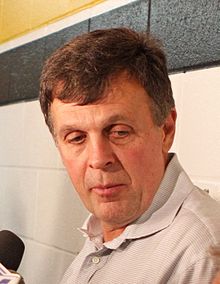 McHale, who was in his fifth season as Houston’s coach, was let go just 11 games into his new three-year, $12 million contract extension. In other words, expectations are high enough that owner Les Alexander was willing to eat millions upon millions to make the change. Top assistant J.B. Bickerstaff was officially hired as an “interim” coach, but sources tell Sheridan Hoops the team is not planning to look for a replacement this season.
McHale, who was in his fifth season as Houston’s coach, was let go just 11 games into his new three-year, $12 million contract extension. In other words, expectations are high enough that owner Les Alexander was willing to eat millions upon millions to make the change. Top assistant J.B. Bickerstaff was officially hired as an “interim” coach, but sources tell Sheridan Hoops the team is not planning to look for a replacement this season.
“Les [Alexander] will do whatever it takes,” general manager Daryl Morey said. “Money never enters the decision for Les.
“This is the fifth-most winning franchise since Les owned the team. We’ve been to the Western Conference finals four times. We don’t lose. We’ll do whatever it takes to win.”
On paper, Houston’s situation isn’t dire. Now 5-7 after a stunning late rally vs. Portland on Wednesday in Bickerstaff’s debut, the Rockets are just one game out of the West’s final playoff spot. With 45 points, James Harden added his third 40-plus point game of the young season and his NBA-best 13th since the start of 2014-15. Of the seven losses, three came without defensive anchor Dwight Howard.
That said, the real story isn’t just that the Rockets have had a few too many unexpected defeats. Rather, it’s how they’ve lost. (For more on this, listen to my latest podcast on McHale’s dismissal.)
EMBARRASSING LACK OF EFFORT
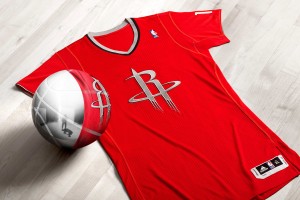 At minus-6.7 points, Houston’s point differential is the second-worst in the entire Western Conference. In the four-game losing streak that led to a 4-7 start and ultimately McHale’s firing, the Rockets allowed a Dallas team playing without Dirk Nowitzki, Chandler Parsons and Wes Matthews to grab a 25-point lead and coast to a double-digit win. Two nights later, Boston went on a 60-19 run to turn a 15-point Rockets advantage in the second quarter into a 26-point deficit by early in the fourth. A few days before, Brooklyn recorded its first win of the entire season against these Rockets.
At minus-6.7 points, Houston’s point differential is the second-worst in the entire Western Conference. In the four-game losing streak that led to a 4-7 start and ultimately McHale’s firing, the Rockets allowed a Dallas team playing without Dirk Nowitzki, Chandler Parsons and Wes Matthews to grab a 25-point lead and coast to a double-digit win. Two nights later, Boston went on a 60-19 run to turn a 15-point Rockets advantage in the second quarter into a 26-point deficit by early in the fourth. A few days before, Brooklyn recorded its first win of the entire season against these Rockets.
The real kicker? All of those instances occurred within the normally friendly confines of Toyota Center in Houston. To put it simply, the Rockets weren’t merely losing. They had stopped competing.
“We probably had more meetings in the last six weeks than in my previous four years here,” McHale said after learning of the news on Wednesday. “It wasn’t working.”
Something had to give.
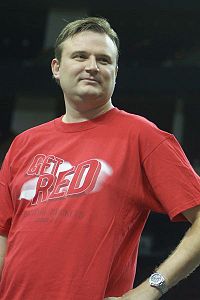 “The team was not responding to Kevin McHale,” Morey said. “We had to make a tough call and had to make it soon. There is not time in the West to wait for a turnaround. We’re losing by double digits to teams we need to beat if we’re even going to make the playoffs.”
“The team was not responding to Kevin McHale,” Morey said. “We had to make a tough call and had to make it soon. There is not time in the West to wait for a turnaround. We’re losing by double digits to teams we need to beat if we’re even going to make the playoffs.”
“They just weren’t responding. It’s the way we’re losing, by how much. J.B. [Bickerstaff] is someone they’ll respond to.”
But how did a team largely comprised of the same core group that went to the conference finals just a few months ago reach this point? The Rockets added Ty Lawson and Marcus Thornton in the offseason while losing Josh Smith, but the vast majority of the rotation – Howard, Harden, Trevor Ariza, Terrence Jones, Clint Capela, Corey Brewer, Pat Beverley and Jason Terry – remained intact.
It is worth noting that power forward Donatas Motiejunas is still rehabbing his back injury after having surgery in April, but the team’s problems clearly run much deeper than one more quality big man.
Quite frankly, the performance has been a mess on both ends. Offensively, Harden is shooting just above 37 percent from the floor, and Ariza, Lawson, Beverley and Brewer are somehow even worse at below 35 percent. No, those aren’t 3-point percentages; those are their overall numbers.
The ball movement has often been stagnant, and Lawson in particular has seemed too willing to stand idly by while Harden alone attempts to create. Bickerstaff replaced him with Terry in the starting lineup on Wednesday, and Lawson had only two points on 1-of-8 shooting and one assist in 20 minutes.
Defensively, with very similar personnel, the Rockets have tumbled from sixth in efficiency (100.5 points allowed per 100 possessions) last season to 29th in efficiency (106.5) during McHale’s 11 games this season. Excessive ball-watching and slow rotations have become routine.
“The only guy that is competing defensively on a nightly basis with an assertiveness and sure of what he’s doing, is Dwight,” McHale said before Monday’s loss to the Celtics, his final game as coach.
BACKCOURT WOES
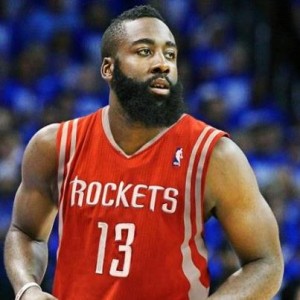 The biggest X-factor, of course, is Harden. After making enormous strides defensively in 2014-15 on his way to an almost-MVP season, he seems to have regressed early in 2015-16 to the form that made him the butt of Vine jokes early in his Houston career. Though Harden’s traditional offensive numbers of 28.8 points, 6.2 rebounds and 6.3 assists are in line with this past season, his player efficiency rating (PER) has fallen significantly — from 26.7 a season ago to 22.8 currently.
The biggest X-factor, of course, is Harden. After making enormous strides defensively in 2014-15 on his way to an almost-MVP season, he seems to have regressed early in 2015-16 to the form that made him the butt of Vine jokes early in his Houston career. Though Harden’s traditional offensive numbers of 28.8 points, 6.2 rebounds and 6.3 assists are in line with this past season, his player efficiency rating (PER) has fallen significantly — from 26.7 a season ago to 22.8 currently.
“I’ve just got to turn my focus up on both ends of the floor and be a better leader out there,” Harden said after Wednesday’s win. “Making shots or missing shots, I’ve got to bring my game and my energy level.”
One thing that stands out is Harden’s offseason activity. Before 2014-15, Harden was motivated by an unexpected first-round loss to Portland and became a leader on Team USA over the summer. Led by Duke coach Mike Krzyzewski, Harden orchestrated a team that won gold in FIBA World Cup play. He reported to training camp a month later in great shape, and the Rockets opened the 2014-15 campaign by ripping off six consecutive wins.
This offseason, however? It got off on the wrong foot when Harden badly sprained an ankle early in his offseason workouts, thereby limiting his basketball activities for much of the summer. He instead made headlines away from the court for his new $200 million shoe contract with Adidas and his new relationship with Khloe Kardashian. And his poor preseason performance — below 40 percent from the field and 30 percent from the three-point line – proved to be a sign of things to come.
As the team’s best player, Harden’s performance typically sets the tone – and too often this season, that tone has been one of flat, listless effort. To that end, Sam Amick and Jeff Zillgitt of USA Today reported Wednesday that Harden’s “play and aloofness” have frustrated his teammates.
Then there’s the issue of Lawson. Harden and the Rockets said before the offseason began that they believed they needed one more perimeter playmaker to truly contend with the likes of defending champion Golden State. Morey made the bold trade with Denver in July, and on paper, the Rockets seemed to have put forth a lineup as good as any in the league.
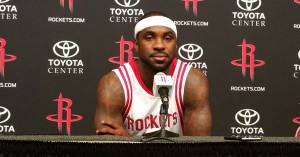 But it hasn’t played out that way on the floor. Lawson has looked tentative and uncertain of his role alongside Harden, and it’s reflected in the numbers. Though Lawson won the starting job over Beverley, he is averaging just 8.3 points and 5.3 assists in 35 minutes for a dreadful PER of 7.5. For perspective, the worst season-long PER of Lawson’s career is 16.4, way back in his 2009-10 rookie campaign.
But it hasn’t played out that way on the floor. Lawson has looked tentative and uncertain of his role alongside Harden, and it’s reflected in the numbers. Though Lawson won the starting job over Beverley, he is averaging just 8.3 points and 5.3 assists in 35 minutes for a dreadful PER of 7.5. For perspective, the worst season-long PER of Lawson’s career is 16.4, way back in his 2009-10 rookie campaign.
Despite having two months before camp to prepare for Lawson’s arrival, Houston’s offensive schemes have looked remarkably similar to the Harden-dominated system from a season earlier. Too often, that has left Lawson as a stationary shooter, and McHale deserves some blame for not figuring out how to use the full extent of his playmaking ability.
And that’s just looking at the offensive end. Defensively, the pairing of Lawson with Harden in the backcourt (instead of starting Beverley, a better defender) has often spelled disaster. McHale said after Monday’s game that he was considering a change to the starting backcourt, and Bickerstaff followed through with that in Wednesday night’s win over the Blazers, benching Lawson for the 38-year-old Terry. Lawson’s demotion came a day after he openly admitted to reporters that the team wasn’t following McHale’s defensive schemes.
“Like coaches’ say, ‘Run this pick-and-roll coverage.’ We were calling something totally different,” Lawson said on Tuesday.
Bickerstaff said the lineup change was partly to “try to get Ty on the floor more without James so the ball could be in his hands to make plays,” but Lawson did not play at all in the fourth quarter and overtime.
DOES BICKERSTAFF BRING ENOUGH CHANGE?
It does seem a bit unfair to hold McHale singularly responsible if the players admittedly weren’t following instructions. When told of McHale’s firing, Dallas coach Rick Carlisle called it “preposterous.”
“It’s beyond belief,” Carlisle said. “I’m really shocked.”
But that’s life in the modern NBA, where players – especially stars like Harden, Howard and even Lawson – hold the cards. Though they share some of the burden for a failure to lead, it’s easier to “fix” the coach than it is to fix the roster.
“We are responsible,” said swingman Corey Brewer, who scored a season-high 16 points and hit a clutch, game-tying three in Bickerstaff’s debut. “Coach can’t make us play hard. That’s up to us. I didn’t see it coming, I’m not going to lie. Me and McHale are really close, so it was tough to hear it.”
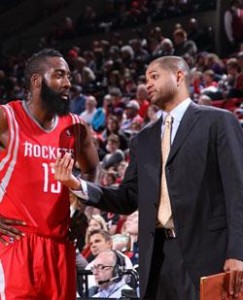 That said, Bickerstaff does have a sterling reputation in team and league circles. He was instrumental in the Rockets’ revamped defense from 2013-14 to 2014-15 and a huge reason why Houston made such an enormous improvement. Just 36 years old, Bickerstaff is an engaging personality and connects deeply with many in the locker room. It’s possible that he takes the reins of a supremely talented team, turns the season around and wins the job on a permanent basis.
That said, Bickerstaff does have a sterling reputation in team and league circles. He was instrumental in the Rockets’ revamped defense from 2013-14 to 2014-15 and a huge reason why Houston made such an enormous improvement. Just 36 years old, Bickerstaff is an engaging personality and connects deeply with many in the locker room. It’s possible that he takes the reins of a supremely talented team, turns the season around and wins the job on a permanent basis.
But it has to be noted that Bickerstaff was already on McHale’s staff and already in charge of most of the team’s defensive schemes. It’s not as if radical changes to the team’s style are expected.
If that’s the case, is this enough change to turn around Houston’s sinking ship?
“We’re going to keep making changes until we win,” Morey said. “If you’re coming off a Western Conference finals run and have mostly the same group, it’s clear that this was not working.”
MORE MOVES COULD BE AHEAD
For now, the coaching switch is the only change Houston reasonably can do. They’re hard-capped and unable to sign most free agents after using their mid-level exception (MLE) over the summer to re-sign K.J. McDaniels and sign second-round pick Montrezl Harrell to a multi-year deal. Moreover, many of their larger contracts (needed to match salaries in potential trades) are not trade-eligible until Dec. 15, the first day in which newly signed players can be dealt.
When that day arrives in a few short weeks, however, the GM’s phone may start blowing up. As Morey spoke with the Houston media on Wednesday, he admitted to a distinct lack of sleep, adding “I look like s—.” The decision to let go of McHale, a good personal friend of Morey’s and someone with a great reputation for working with Houston’s analytics-minded front office, did not come easily.
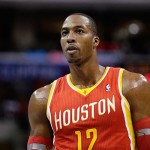 But in the loaded West, even a few losses can dramatically alter a season. Last season, the difference between the No. 2 seed (Houston, 56-26), providing home-court advantage in two rounds, and the No. 6 seed (San Antonio, 55-27), meaning no home-court advantage at all, was one loss.
But in the loaded West, even a few losses can dramatically alter a season. Last season, the difference between the No. 2 seed (Houston, 56-26), providing home-court advantage in two rounds, and the No. 6 seed (San Antonio, 55-27), meaning no home-court advantage at all, was one loss.
Looking beyond this season, two of Houston’s three core pieces (Howard and Lawson) are potentially free agents next summer. In Howard’s case, the promise of tutelage from McHale was a big reason why he chose to sign in Houston in the first place. Because of that, a lost season isn’t something the Rockets’ front office can accept. Championship windows in the ultra-competitive West are rare, and the sense of urgency in Houston is at an all-time high.
For now, that makes McHale the fall guy. But if things don’t turn quickly, he may not be the only one.
“I need to look in the mirror,” Morey said. “Every player and coach needs to do that. What can each of us do better?
“We don’t accept losing. We haven’t lost since I’ve been here. We have bigger aspirations. This group is a championship contender and isn’t playing like one. We can turn this around. We have to.”
The clock is ticking.
Ben DuBose is a veteran sports reporter who has followed the Houston Rockets and the NBA since Hakeem Olajuwon was Akeem Olajuwon. He writes for both SheridanHoops and ClutchFans, an independent Rockets blog. You can follow him on Twitter.